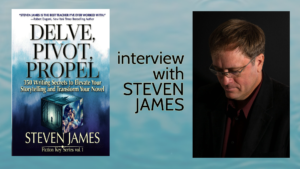book coach
For today’s post I’m once again sharing the spotlight, this time with Steven James, whose writing guides are indispensable. His latest, Delve, Pivot, Propel, which arrived on December 3rd, is a crucial addition to his previous work, and it explores one particular issue I think is often neglected, inadequately addressed, or misunderstood: the pivot, aka the turning point or twist.
Steven is a critically acclaimed author of twenty novels and numerous nonfiction books that have sold more than 1 million copies. His books have won or been shortlisted for dozens of national and international awards. In addition, his stories and articles have appeared in more than eighty different publications, including the New York Times. He is also a popular keynote speaker and professional storyteller with a master’s degree in storytelling.
David: You’re one of the most relentlessly curious students of storytelling I’ve ever met. You’re always thinking about what makes stories great and how writers can accomplish that. Could you briefly outline what prompted you to take this new step in examining how stories work? What did you think was missing from other analyses of story? At one point you write, “[T]heexisting story theories were missing something essential to great stories, a moment in the narrative I’ve come to refer to as the pivot.” Was there anything else you noticed missing from existing analyses of stori
Steven: I’ve heard so many people espouse that stories have,“A beginning, a middle, and an end.” And every time I hear that, I think, “So does a bratwurst. How does the help me write my story?” Now, there’s nothing inherently wrong with this approach, but I don’t love it because it gives people the impression that a story is about a list of events—but it’s not. That’s a report. A story is about the collision of desires, not a progression of events.
Similarly, I had been trapped in the box of thinking of stories simply within a temporal framework—first act, second act, third act… inciting incident, rising action, dénouement—that sort of thing. It took me a long time to shift my thinking toward the narrative dynamics of the story and the essential elements to the story rather than continuing to parrot back the temporal aspects of story theory that we have all heard before. After all, you can have a story that works on the level of beginning, middle and end, but be entirely unsatisfying. How could that be? What were we missing? It took me a long time to realize what that was, and how to fix it in our stories.
The other aspects of story that I found were not taught enough were the pursuit and the payoff—that effective stories are not so much journeys as they are pursuits. And, you can have all the plot you want, but if there’s no emotional payoff in the story, you’re not going to impact your readers. So, I really had to step back from the paradigms I’d always heard (and taught) and take some new avenues toward a fresh perspective on story.
Stories always include tension, which is the result of desire meeting up with an obstacle. So, characters face an obstacle and, because of their unmet desire, they make purpose-infused choices that propel […]
Read MoreThe last episode of season 2 of The Bear was a study in tension–for a show that is renowned for producing tension in the viewers, the last episode is a masterclass. What the writers did to the main character was cruel and amazing. No spoilers, but there’s a mishap due to the MC’s own inaction. They could have made it a little speed bump, let him twist for a few minutes and then fix it. But there was no fix. They made him suffer for a long time, and he acted out of all his wounds and fears and put himself in a worse place than when the episode started.
As a writer, I was jealous.
I want to do that! However, I keep not doing that. I have to constantly work on making characters live with the consequences of their and others’ words and actions.
Giving up too easily (without good reason)
I let my characters give up too easily. I put them in tension- and conflict-filled interactions, but I “pull the rug from beneath the stakes” — a direct quote from a writing coach on my current work in progress.
The scene that inspired this comment had 12-year-old Sam arguing with his 13-year-old cousin Jake. Jake had grabbed something important to Sam and was being reckless with it. Sam managed to get it back, but with barely more than a, “Come on. Can’t you take a joke” from Jake, Sam agrees to share the item and he and Jake work well together. Sam didn’t hold Jake accountable for his words and actions, which put the item at risk and denied how important it was to Sam. I’d done a good job of setting up serious conflict, but didn’t follow through. I let Sam give up, and I didn’t give him a good reason to do so.
Promising one thing and delivering another (with no hints)
It reminded me of a moment in The Help that frustrated me. After African American domestic worker Minny Jackson was fired for using a white household’s bathroom, she is hired by outcast white housewife Celia Foote. Celia keeps Minny secret from her husband Johnny, so she can pass off Minny’s cooking and housekeeping as her own. Minny and Celia wind up treating each other with respect and compassion, and Minny saves Celia’s life. It is lovely, but it’s also a source of tension because Minny is terrified, certain Johnny will shoot her if he finds out.
When he does, instead of doing anything violent, or being angry or even annoyed, he’s grateful to Minny. Kind, even. Celia and Johnny invite Minny to a special meal Celia was up all night making. Minny eats it at their dining room table while they look on adoringly. Johnny tells her she has a job for life.
If Minny had been my friend, I would’ve been so happy for her. What an amazing twist.
But as a reader, I was mad. Not that I wanted bad things to happen to Minny, but I was set up to expect them, and wasn’t given enough hints that Johnny had a different character than Minny thought. To have their interaction become over-the-top rose-colored made all that buildup feel utterly pointless. Instead of being delighted that Minny was so wrong about […]
Read MoreFrom the Flickr of briantvogt, INFphoto.com.Ref: infusmi-20/21|sp
My last article, in March, addressed the process of finding and hiring a professional editor for a novel manuscript, comparing the insecurity this sparked as akin to entering one’s dolled-up toddler in a baby beauty contest. There might be harsh criticism and unflattering light. My metaphor was similar to one I’ve used to describe the sensation of having a novel launch into the world: It’s like pushing one’s naked toddler out into traffic to cross a busy intersection alone, while one can only watch what happens from the curb (and one is also naked). So, yeah. Anxiety is involved.
I promised an update in this installation, and I know that millions of you have been on the edge of your seats waiting to hear how it’s going.
It’s going well. Thanks for asking.
As I mentioned last time, there are many ways to find a professional editor. I’ve heard recommendations from writing bloggers, and there are many options available through reputable sources, such as Poets & Writers magazine and The Author’s Guild (if you’re a member). HERE are some great articles and advice from the WU archives.
I asked some fellow historical novelists about their experiences with editors-for-hire. Denny S. Bryce’s next novel, THE OTHER PRINCESS: A NOVEL OF QUEEN VICTORIA’S GODDAUGHTER, comes out in October from Harper Collins. Denny had this to say: “For my first novel, I hired a developmental editor. I wanted to work with someone who had been an editor at a traditional house and could help me with character arcs, turning points, and conflict. I considered the decision an investment in my writing career, and working with her one-on-one definitely contributed to my growth as a writer and the success of my first novel: WILD WOMEN AND THE BLUES.” (Kensington, 2021).
For me, a conversation with a fellow historical novelist led me to an introduction. Have you ever “met” a fellow writer on social media, and instantly liked their vibe, and then loved their book, and struck up some sort of friendship? That happened with me and Tori Whitaker, author of MILLICENT GLENN’S LAST WISH (Lake Union, 2020) and A MATTER OF HAPPINESS (Lake Union, 2022) when we bonded over launching books during a pandemic. Tori is a bourbon aficionado and perhaps something of an expert on the subject. I asked her to contribute a cocktail recipe to my annual series of December Instagram posts called “The Twelve Cocktails of Christmas”. (Tori’s Holiday Old Fashioned recipe was excellent, BTW).
Tori had this to say about her choice to hire an editor: “I retained a trusted developmental editor whose work I admired and who brought 20+ years’ experience teaching writing. That decision was indispensable in finally landing a deal for my debut novel—rather than having another book stuck in a drawer.”
Since Tori writes historical novels, I trusted her personal recommendation and contacted her editor, Jenna Blum. Jenna requested five pages of my manuscript and […]
Read MoreToday, we welcome back author, book coach, and actress Mary McDonough. Mary has kindly agreed to write a series of book-coach-related posts for us–because sometimes (often? in nearly every instance?) it takes more than a single action to deal with the boulders you’ll meet on the road to publication.
Welcome, Mary!
I feel blocked about writing my second piece for Writer Unboxed. While I did poop scoop today (click HERE if you missed my first article), I’m finding all kinds of other reasons not to write. Why, I ask myself? I’ve known what I want to write about since I finished the first article. But here I sit, facing an obstacle course that is holding me back. Perfect how the Universe brought me these blocks to consider as I write this article. Coach, coach thyself!
My last article addressed the negative voice that sometimes, or always, takes over our headspace. The inner critic who paralyzes us and crushes our creative spirit. The “You can’t have that; you can’t do that” voice. I call it the No-No Voice. It leads us away from writing. For me, I tend to look at all the shiny things in my office instead of writing. Look, is that a woodpecker tapping into the facia on my house? What a lovely rose quartz crystal. Maybe I should hold it for a while. Meditation is always good. Oh yeah, writing the article. Focus, Mary.
I often hear my clients say, “So now that I KNOW about the No-No Voice, how do I stop it?” They want to get rid of it immediately and forever. Some clients want to strangle or kill it like a character in their books, which is great because here comes the creative instinct! But I encourage a deeper dive into why these obstacles are there in the first place, so we can learn to move past or around them, because they do come back. I’ve even challenged people to use the blocks to their advantage. “But how?” they say.
At times in my life, I’ve been convinced the blocks on my path stop me from getting where I want to be. It’s all their fault and now I’m stuck. When this happens, I can usually see stuck-ness all over my life. In my emotions, my relationships, driving to the market with stupid drivers all around me. Even my dog works my last nerve. It can’t be the dog’s fault.
When I’m stuck in my writing, I see stuck-ness all over there, too. My plot feels stuck, my characters are stuck, my career is stuck. I just can’t get myself to enter the course to get back on track. I watch the blocks grow into boulders and then rise into unsurmountable mountains. Other times I see quicksand waiting to get me if I move forward. I see no way to get back on my writing road. This is when the No-No Voice can jump in and have a field day.
The narrative can sound like this: I can only write what I know. I have a deadline. I feel pressure. I’m not that good. My story sucks. I can’t write outside my gender, race, religion, age, or experience. I haven’t lived or researched enough. I’m too… […]
Read MorePlease welcome author and book coach Mary McDonough to Writer Unboxed today!
If the name Mary McDonough sounds familiar, it may be because she portrayed Erin on The Waltons for a decade. Mary chronicles her Walton family and life beyond the mountain in Lessons from the Mountain, What I Learned from Erin Walton. Her debut novel, One Year, was published in 2014, followed by a second novel, Christmas on Honeysuckle Lane, which was made into a Hallmark movie.
“A warm, heartfelt novel about what it means to belong to a family. You won’t want to put it down.” –Mary Alice Monroe, New York Times bestselling author of A Lowcountry Wedding
Perhaps the result of the many years she spent working in and successfully navigating her place in a difficult and highly visible industry, it seemed only natural for Mary to connect and guide others. Thus, her work as a Life Coach began. We’re thrilled to have her with us today wearing that Life Coach hat, ready to advise and guide and do that thing she does so well.
You can learn more about Mary on her website, and follow her on Facebook and Instagram.
Ever have those days where ANYTHING sounds better that writing? I’ve had many. Sometimes the days stretch out to weeks. One day, as I was avoiding life in general and my novel in particular, I found myself gazing out into the backyard. My dog was lying in a sunny spot, enjoying himself. For a second, I wished I had a dog’s life, but then I remembered, I have to finish my book. I should be writing. Then a thought wafted into my head.
Mary, you need to poop-scoop the back yard. You haven’t done it since yesterday.
And off I went. Dutifully picking up doody. I went into the garage to toss my prize and saw the trash had piled up. What better time to take out the rubbish and organize it for trash day, which was only five days away? Of course, after that task, I had to wash my hands. As the warm water slid over my palms and the scent of soap filled my nose, I realized it was late—too late to get motivated or in the mood to write. That would take forever, I told myself. So I started making dinner instead.
Just like that, another day had passed, and I had not written a single word.
As a writing coach, I’ve seen procrastination with clients as well. I had to be accountable to myself, and take a coach-approach to my own writing. When I realized I’d rather clean my garage, scrape the BBQ, exercise, or even scoop poop than sit my butt in the chair and write, I had to ask myself why.
Did I really not want to finish my novel?
I knew that wasn’t true. My desire to share my story was all-consuming.
So, why do we do it? Avoid the page, the computer, and sometimes stay away from our designated writing nooks. Why do we avoid writing at all costs when we know it is our passion? We crave adding the words “The End” to anything. We love being a […]
Read More












